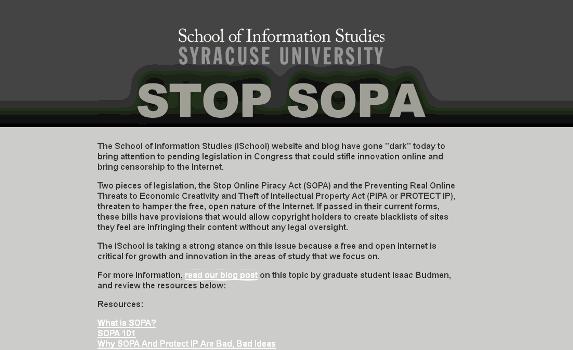Thousands of websites, from major sites like the social news website Reddit, the Internet Archive’s main site, and the English-language version of Wikipedia, to small personal WordPress blogs, have “gone dark” today as part of a coordinated protest against the controversial Stop Online Piracy Act (SOPA), currently in committee in the House, and the Preventing Real Online Threats to Economic Creativity and Theft of Intellectual Property Act (PIPA), scheduled for a Senate vote on January 24. Among the sites taking part are those of Digital Public Library of America and the Syracuse University iSchool, as well as several popular blogs in the library world.
The legislation primarily targets copyright infringement by foreign websites, but enforcement provisions, which have included website blocking provisions, have drawn fire from critics. The protesting sites generally consist of a single page explaining the protest, containing links for more information about the legislation. (A list of some announced sites that are participating is here.)
The website of the Digital Public Library of America has a statement saying that the legislation “would force libraries to censor access to [written, recorded, and visual] culture, expose librarians to criminal penalties for doing their jobs, and threaten the network on which the future Digital Public Library of America would rely.”
Syracuse University’s School of Information Studies (iSchool) is also taking part in the protest. In a blog post yesterday, graduate student Isaac Budmen detailed the issues surrounding the legislation, and wrote:
This is our moment—the moment where we can shape the future of information, technology and the collective human knowledge. I challenge you to learn, to consider, to learn some more and then to choose your stance on SOPA and PIPA. I hope you choose to stand with all of us here at the iSchool, and fight to protect the right to share information openly.
Librarian blogs taking part include Vermont librarian Jessamyn West’s librarian.net blog (which today has the statement, “Dear Congress, It’s No Longer OK To Not Know How The Internet Works”); San Rafael, CA-based librarian Sarah Houghton’s Librarian in Black blog; University of Tennessee at Chattanooga librarian and technologist Jason Griffey’s Pattern Recognition blog; and the library news site LISNews, among others.
In a blog post today, Corey Williams, the associate director of the Office of Government Relations for the American Library Association (ALA), wrote that the ALA “applauds” all of the websites taking part in the protest.
“The day-long blocking of websites highlights the outright denial of access to information these bills would likely impose,” he wrote. “Ironically, for two bills that are supposed to combat ‘foreign’ counterfeiting or copyright infringing, today’s demonstration highlights how they would likely hit home right here in the U.S.”
As LJ reported, White House technology officials came out firmly on January 14 against provisions involving website blocking, one of the most controversial aspects of SOPA and PIPA. (SOPA opponent Rep. Darrell Issa (R-CA) announced Friday that House Majority Leader Eric Cantor (R-VA) said that the provision would be removed from SOPA, and that the bill would not come to a vote until there had been more work “to address outstanding concerns.”)
The Library Copyright Alliance, made up of the ALA, the Association of Research Libraries, and the Association of College & Research Libraries, expressed concern about SOPA in November. (A draft version of a third bill released last month and touted as an alternative to SOPA and PIPA, the OPEN Act, was welcomed by the LCA.)
On January 10, the ALA’s Washington office released a “PIPA, SOPA and the OPEN Act Reference Guide” [PDF] detailing the differences between the various bills.



